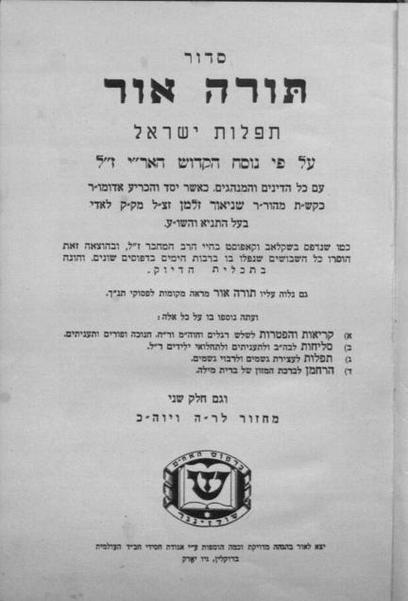When Rav Yitsḥak Luria, zt”l, also known as the Holy ARI, davvened in Eretz Yisroel he brought about a series of liturgical innovations witnessed in later siddurim. His particular nusaḥ bridged minhag Ashkenaz and minhag Sefarad (the customs of the Rheinland Jews and the customs of the Jews of the Iberian Peninsula) with the teachings of his school of Kabbalists. When two centuries later, the Ḥassidic movement blossomed in Eastern Europe, it found purchase in Lithuania among a mystical school centered around Rav Schneur Zalman of Lyadi, the Alter Rebbe and founder of the ḤaBaD movement within Ḥassidism. The Alter Rebbe compiled his own siddur, the Siddur Torah Ohr, “according to the tradition of the ARI.”

The most recent edition of this siddur, the Siddur Tehillat HaShem, was published with additions of the late Lubavitcher Rebbe, and is found widespread across the many ḤaBaD Houses and other institutions affiliated with the ḤaBad movement he once presided over. Neither text of the Siddur Torah Ohr, nor the Siddur Tehillat Hashem is extant in a free digital edition. The Open Siddur Project is busy transcribing the contents of the Siddur Torah Ohr to contribute a digital edition to the Public Domain.
Transcribing any text can be arduous, if rewarding work for a single person. That is why we are crowd-sourcing this effort. Little did we know that a young Ḥasid, Shmueli Gonzales, had already taken it upon himself the heavy burden of converting this work from printed text to digital, machine readable Hebrew letters.
Shmueli went ahead and formatted the text in the Open Document formatted files below. (You can use LibreOffice to open or edit them.) The current version (3.0+) of the modules are formatted entirely with free and open source fonts.
Shmueli describes his work in this way:
It is provided via the Internet as a resource for study and for use for prayer when a Siddur is not immediately available. This text was created with the many people in mind that travel through out the world and find, to their horror, that their Siddur is missing. Now it’s accessible for all of us in those emergency situations.
One should not rely only upon this text. A Siddur is not just an order of prayer. It is intended to serve as a text for education in Jewish tradition and the keeping of mitzvot. This text lacks many of those qualities. Thus, one should own a Siddur of their own and study it.
| The Blessing Book (v.3.31) | ODT | TXT | |
| T’fillat HaDerekh (Traveler’s Prayer for a Safe Journey, v.3.0) | ODT | TXT | |
| Birkhot HaShaḥar (Morning Blessings, v.3.82) | ODT | TXT | |
| Shaḥarit (Morning, v.3.31) | ODT | TXT | |
| Minḥa (Afternoon, v.3.42) | ODT | TXT | |
| Ma’ariv (Evening, v.3.12) | ODT | TXT | |
| The Bedtime Shema (v.3.5) | ODT | TXT | |
| Tikkun Ḥazot (v.3.1) | ODT | TXT | |
| Kabbalat Shabbat (Friday Evening, Receiving the Shabbat, v.3.4) | ODT | TXT | |
| Shabbat Shaḥarit and Mussaf (Saturday morning, v.3.3) | ODT | TXT | |
| Shabbat Minḥah (Saturday afternoon, v.3.1) | ODT | TXT | |
| The Shabbat Book (Candle lighting, Meals, and Havdalah, v.3.2) | ODT | TXT | |
| Ḳiddush Levana (Blessing of the New Moon, v.3.3) | ODT | TXT | |
| Hallel and Musaf for Rosh Ḥodesh (New Moon’s Day, v.3.3) | ODT | TXT | |
| Tefillat L’Shalosh Regalim (Prayers for Sukkot, Shemini Atzeret, Pesaḥ, and Shavuot, v.3.0) | ODT | TXT | |
| Seder Hosha’anot for Sukkot, Hoshanah Rabba, and Hakafot for Simḥat Torah (3.0) | ODT | TXT | |
| Blessings for Ḥanukkah (v.3.0) | ODT | TXT | |
| Blessings for Reading Megillat Esther (v.3.0) | ODT | TXT | |
| Sefirat HaOmer (Counting the Omer, v.3.31) | ODT | TXT |
Join us in creating a faithful digital transcription of the Siddur Torah Ohr (R’ Schneur Zalman of Liadi (1745-1812)), a critical text of the nusaḥ ha-ARI z”l.
The Siddur Torah Ohr was originally prepared by the Alter Rebbe, R’ Schneur Zalman of Liadi (1745-1812), the founder of the חב״ד ḤaBaD movement within Ḥassidut. Torah Ohr witnesses the Nusaḥ Ha-Ari, a nusaḥ prepared by R’ Schneur Zalman of Liadi according to the tradition of R’ Yitzchak Luria, also known as the ARI. This siddur was originally published in 1803 in Shklov. The edition we are transcribing was prepared by anonymous editors according to the text of R’ Schneur Zalman of Liadi and published by Shulzinger Brothers in Brooklyn, New York 1940.
Transcribing Siddur Torah Ohr began in the Summer of 2010 and continues today. Transcription of the siddur including commentary began in 2006 on Wikisource. Integration of wikisource material with this transcription effort was completed in July 2010. In June 2010, we received some transcriptions of liturgy prepared by Shmuel Gonzales for a another, later siddur prepared by Ḥabad, the Siddur Tehillat Hashem. If you are looking for downloadable segments of transcribed liturgy, please check Shmuel Gonzales’ Nusach Ha-Ari transcriptions.
After transcription and proofreading, this new digital edition will be shared under a Creative Commons Zero (CC0) Public Domain dedication. The edition will then be encoded in TEI XML and archived in the Open Siddur database, a libre Open Access liturgy database.
Skills necessary
To participate in this transcription project, you will need the following:
- basic literacy in Hebrew.
- typing with a Hebrew keyboard layout including the full range of Hebrew diacritics (niqqud and t’amim) — (see here for more information)
- registration in the collaborative transcription project, Hebrew Wikisource.


